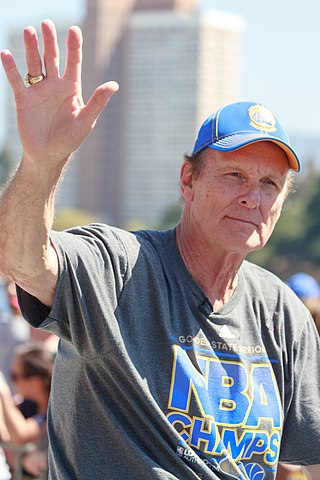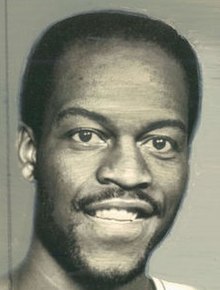Professional career
Williams was selected in the second round of the 1975 NBA draft by the Golden State Warriors and in the first round of the 1975 ABA draft by the Spirits of St. Louis. Williams signed with the Warriors for the 1975–76 season and was named to the NBA All-Rookie Team in his first season. [1] Williams played two seasons with the Warriors before he was allowed to leave as a free agent before the 1977–78 season, when he signed with the Seattle SuperSonics.
While with Seattle, Williams was twice selected to the NBA All-Star Game, and was an All-NBA First Team (1982) and All-NBA Second Team (1980) selection. Williams, whose style of play earned him the nickname "the Wizard", [2] led the Sonics to the 1979 league title while averaging a team-high 28.6 points per game in the Finals.
While in the prime of his career, Williams sat out the entire 1980–81 season due to a contract dispute. He returned in 1981–82 and was named the NBA Comeback Player of the Year after finishing seventh in the league in scoring (23.4). [3] He played three more seasons with the Sonics after that. In 1984, he signed with the Washington Bullets. During the 1984–85 season Williams played alongside the similarly named Guy Williams.
He finished his career with a 17.1 point-per-game scoring average in a career spanning 12 years from 1975 to 1987. In 2004 Williams' #1 jersey was retired by the Sonics. In 2016 Williams' jersey was retired by USC.
Williams' younger brother Ray (1954–2013) also played in the NBA. [4]

Richard Francis Dennis Barry III is an American retired professional basketball player who starred at the NCAA, American Basketball Association (ABA) and National Basketball Association (NBA) levels. Barry ranks among the most prolific scorers and all-around players in basketball history. He is the only one to lead the National Collegiate Athletic Association (NCAA), ABA, and NBA in points per game in a season. He ranks as the all-time ABA scoring leader in regular season and postseason (33.5) play, while his 36.3 points per game are the most in the NBA Finals history. Barry was also the only player to score at least 50 points in a Game 7 of the playoffs in either league until Stephen Curry and Jayson Tatum both reached that mark in 2022. He is one of only four players to be a part of a championship team in both leagues.
Donald Earl "Slick" Watts is an American former basketball player who was the first NBA player to lead the league in both assists and steals, in 1976.

Jack Wayne Sikma is an American former professional basketball center. He was a seven-time NBA All-Star with the Seattle SuperSonics, who drafted him in the first round with the eighth overall pick of the 1977 NBA draft. In 1979, he won an NBA championship with Seattle. Sikma finished his playing career with the Milwaukee Bucks. He was elected to the Naismith Basketball Hall of Fame in 2019.

Calvin Lawrence Booth is an American basketball executive and a former professional basketball player who currently serves as the general manager of the Denver Nuggets.
Reggie Williams is a retired professional basketball player who played ten seasons in the National Basketball Association (NBA). He was an All-American college player at Georgetown University and was a member of their 1983–84 National Championship team.
Gregory Ballard was an American professional basketball player and NBA assistant coach. A collegiate All-American at Oregon, Ballard averaged 12.4 points and 6.1 rebounds over an eleven-season NBA career with the Washington Bullets, Golden State Warriors and briefly, the Seattle SuperSonics.

Rodney King Thorn is an American basketball executive and a former professional player and coach, Olympic Committee Chairman, with a career spanning over 50 years. In 2018, Thorn was inducted into the Naismith Memorial Basketball Hall of Fame.
George Thomas Johnson is an American retired professional basketball player. A 6'11" forward/center born in Tylertown, Mississippi and from Dillard University, he played in 13 National Basketball Association (NBA) seasons as a member of the Golden State Warriors, the Buffalo Braves, the New Jersey Nets, the San Antonio Spurs, the Atlanta Hawks, and the Seattle SuperSonics.
Fred Brown, nicknamed "Downtown Freddie Brown", is an American former professional basketball player. A 6 ft 3 in (1.91 m) guard from the University of Iowa, he played 13 seasons (1971–1984) in the NBA, all with the Seattle SuperSonics. Known for his accurate outside shooting, Brown was selected to the 1976 NBA All-Star Game and scored 14,018 points in his career.

Walter Frederick Walker is an American former professional basketball player. He is best known for his National Basketball Association (NBA) career – both as a player and as a front office executive for the Seattle SuperSonics.
The 1975 NBA draft was the 29th annual draft of the National Basketball Association (NBA). The draft was held on May 29, 1975, before the 1975–76 season. In this draft, 18 NBA teams took turns selecting amateur U.S. college basketball players and other eligible players, including international players. The first two picks in the draft belonged to the teams that finished last in each conference, with the order determined by a coin flip. The Atlanta Hawks, who obtained the New Orleans Jazz first-round pick in a trade, won the coin flip and were awarded the first overall pick, while the Los Angeles Lakers were awarded the second pick. Prior to the draft, the Kansas City-Omaha Kings were renamed the Kansas City Kings. Before the draft, 18 college underclassmen and 2 high school players were declared eligible for selection under the "hardship" rule. These players had applied and gave evidence of financial hardship to the league, which granted them the right to start earning their living by starting their professional careers earlier.
The 1979 NBA World Championship Series was the championship series played at the conclusion of the National Basketball Association (NBA)'s 1978–79 season. The Western Conference champion Seattle SuperSonics played the Eastern Conference champion Washington Bullets, with the Bullets holding home-court advantage, due to a better regular season record. The SuperSonics defeated the Bullets 4 games to 1. The series was a rematch of the 1978 NBA Finals, which the Washington Bullets had won 4–3.
The 1978 NBA World Championship Series was the championship round of the National Basketball Association (NBA)'s 1977–78 season, and the culmination of the season's playoffs. The series featured the Western Conference champion Seattle SuperSonics against the Eastern Conference champion Washington Bullets. The Bullets defeated the SuperSonics in seven games to win their first NBA championship. Bullets power forward/center Wes Unseld was named MVP of the series. Before the Cleveland Cavaliers' Game 7 win at Golden State in the 2016 NBA Finals, this was the last time a road team had won Game 7 in the NBA Finals. The 1978 World Championship Series was the first NBA Finals series since the 1958 World Championship Series in which both teams had under 50 wins, and is the only NBA Finals to feature two teams with under 50 wins in an 82-game season.
James Michael McIlvaine is an American former professional basketball player who spent seven seasons in the National Basketball Association (NBA) with the Washington Bullets, Seattle SuperSonics, and New Jersey Nets. The 7-foot-1 shot-blocking specialist is perhaps best remembered for the fall-out that occurred after he signed with the Seattle SuperSonics in 1996.
Marvin Nathaniel Webster was an American professional basketball player. He played one season in the American Basketball Association (ABA) and nine in the National Basketball Association (NBA) with the Denver Nuggets (1975–77), Seattle SuperSonics (1977–78), New York Knickerbockers (1978–84) and Milwaukee Bucks (1986–87). His nickname was The Human Eraser because of his impressive shot blocking talent.

Lonnie Jewel Shelton was an American National Basketball Association (NBA) player who played from 1976 to 1985.
The 1979 NBA playoffs was the postseason tournament of the National Basketball Association’s 1978–79 season. The tournament concluded with the Western Conference champion Seattle SuperSonics defeating the Eastern Conference champion Washington Bullets 4 games to 1 in the NBA Finals. The Sonics earned their only NBA title. Dennis Johnson was named NBA Finals MVP.

Bruce A. Seals was an American basketball player in the American Basketball Association (ABA) and the National Basketball Association (NBA).

The Seattle SuperSonics were an American professional basketball team based in Seattle. The SuperSonics competed in the National Basketball Association (NBA) as a member of the Western Division (1967–1970), and later as a member of the Western Conference's Pacific (1970–2004) and Northwest (2004–2008) divisions. After the 2007–08 season ended, the team relocated to Oklahoma City, where they now play as the Oklahoma City Thunder.
The 1977–78 NBA season was the team's 17th season in the NBA and their 5th season in the city of Washington, D.C. It would prove to be their most successful season, as they would win their first and only NBA championship as of 2024. In the NBA Finals, they defeated the Seattle SuperSonics in seven games.








